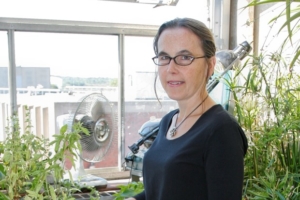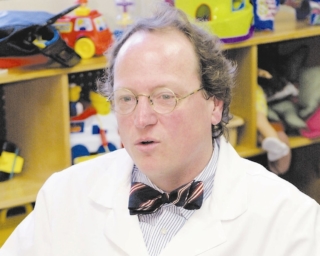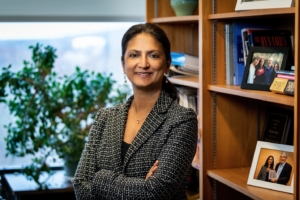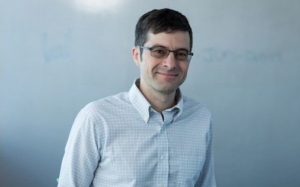PROFESSORSHIPS PERTINENT TO AUTISM RESEARCH
Reflective of its commitment to improve the understanding of autism from a scientific perspective, the Nancy Lurie Marks Family Foundation has established several Nancy Lurie Marks Professorships over the years at leading institutions and universities throughout the Greater Boston area. These NLM Professorships have been created in an effort to recruit and retain top-notch scholars, researchers, and professors into the field of autism. The intent is to recognize scholarly excellence and provide competitive resources for these researchers to pursue exceptionally novel ideas for the advancement of autism research and treatment.
Leslie Griffith, Ph.D.
Nancy Lurie Marks Professor of Neuroscience
Brandeis University
 Leslie Griffith, Ph.D., the Nancy Lurie Marks Professor of Neuroscience and Director of the Volen Center for Complex Systems at Brandeis University, studies sleep and memory using Drosophila melanogaster. Dr. Griffith’s interests range from the biochemistry of neuronal signal transduction, in particular the role of CaMKII in memory formation, to the hierarchical relationships between complex behaviors such as sleep and learning. Her laboratory uses genetic approaches in Drosophila melanogaster to understand the basic biological processes that underlie human cognition and neurological diseases. Dr. Griffith and colleagues have been active in developing tools that allow interrogation of molecular and cellular processes with temporal and spatial resolution in freely behaving animals to bridge the molecule-behavior gap.
Leslie Griffith, Ph.D., the Nancy Lurie Marks Professor of Neuroscience and Director of the Volen Center for Complex Systems at Brandeis University, studies sleep and memory using Drosophila melanogaster. Dr. Griffith’s interests range from the biochemistry of neuronal signal transduction, in particular the role of CaMKII in memory formation, to the hierarchical relationships between complex behaviors such as sleep and learning. Her laboratory uses genetic approaches in Drosophila melanogaster to understand the basic biological processes that underlie human cognition and neurological diseases. Dr. Griffith and colleagues have been active in developing tools that allow interrogation of molecular and cellular processes with temporal and spatial resolution in freely behaving animals to bridge the molecule-behavior gap.
Previously, the Nancy Lurie Marks Professor of Neuroscience was held by Art Wingfield, D. Phil, a pioneer in the fields of speech comprehension, cognitive aging, memory and aphasia who taught at Brandeis for more than four decades.
Christopher J. McDougle, MD
Nancy Lurie Marks Professorship in the Field of Autism
Lurie Center for Autism
Massachusetts General Hospital for Children
 Christopher J. McDougle, MD, the first incumbent of the Nancy Lurie Marks Professorship in the Field of Autism at Harvard Medical School, joined the Massachusetts General Hospital in 2011 at the inaugural director of the Lurie Center for Autism. Dr. McDougle is a neuropsychopharmacologist and internationally-recognized expert in research and treatment of neurodevelopmental disorders that extend into adulthood. He has 30 years of experience diagnosing and caring for children, adolescents and adults with autism spectrum disorder (ASD).
Christopher J. McDougle, MD, the first incumbent of the Nancy Lurie Marks Professorship in the Field of Autism at Harvard Medical School, joined the Massachusetts General Hospital in 2011 at the inaugural director of the Lurie Center for Autism. Dr. McDougle is a neuropsychopharmacologist and internationally-recognized expert in research and treatment of neurodevelopmental disorders that extend into adulthood. He has 30 years of experience diagnosing and caring for children, adolescents and adults with autism spectrum disorder (ASD).
Dr. McDougle received a B.A. in chemistry from Valparaiso University in 1981 (with Highest Distinction) and an M.D. from Indiana University School of Medicine in 1986 (with Highest Distinction). He subsequently completed a residency in psychiatry at Yale University School of Medicine (1990) and a fellowship in child and adolescent psychiatry at the Yale Child Study Center (1995).
Before coming to Mass General, Dr. McDougle was the Chairman of the Department Psychiatry and Executive Director of the Institute of Psychiatric Research at Indiana University School of Medicine, where he was also the Albert Eugene Sterne Professor of Psychiatry.
Dr. McDougle has maintained an active clinical practice throughout his career and continues this commitment to caring for individuals with ASD at the Lurie Center, where he has expanded services for adults.
As Director of the Lurie Center for Autism, Dr. McDougle is keenly interested in leveraging the vast resources that exist at Mass General and elsewhere in Boston to advance new discoveries and treatments for children, adolescents and adults with ASD. One of Dr. McDougle’s initial goals for the Lurie Center for Autism is to develop a translational research “from bench to bedside”- program. Building on the hospital’s expertise in genetics, brain imaging, electrophysiology, informatics, neuroscience, pediatric and developmental medicine, neurology and psychiatry, the Center will look for better, faster ways to diagnose and treat children, adolescents and adults with ASD. Optimistic about the potential that exists for new therapeutic strategies, Dr. McDougle is now engaged in the development of several multi-site trials focused on treating the symptoms that often accompany an ASD diagnosis.
Monika Mitra, Ph.D.
Nancy Lurie Marks Professor of Disability Policy

Photo by Liz Linder
The Lurie Institute
The Heller School for Social Policy and Management
Brandeis University
Dr. Monika Mitra is the Nancy Lurie Marks Associate Professor of Disability Policy, and Director of the Lurie Institute for Disability Policy at Brandeis University’s Heller School for Social Policy and Management. Her research focuses on the health and wellbeing of people with disabilities and their families. She co-leads the Community Living Policy Center which is aimed at improving policies and practices that advance community living outcomes for people with disabilities and the National Research Center for Parents with Disabilities which is focused on addressing knowledge gaps regarding the needs of parents with diverse disabilities and their families. Prior to joining Brandeis, Dr. Mitra was Associate Professor in the Department of Family Medicine and Community Health at the University of Massachusetts Medical School. She received her PhD and MA from Boston University, and her MS from Calcutta University, Kolkata, India.
The Lurie Institute for Disability Policy, established in 2007, was created by the Nancy Lurie Marks Family Foundation to ensure that people with disabilities, particularly autism, are fully integrated in society. Through research, teaching, policy development, education, and public engagement, the Lurie Institute provides a comprehensive approach to addressing disability issues across the lifespan. Faculty at the Lurie Institute for Disability Policy teach and mentor undergraduate, master’s, and doctoral students, and postdoctoral fellows. Current research projects cover a wide variety of topics, including community integration, health, family caregiving, poverty, civic engagement, and social inequality. The Lurie Institute combines empirical research and lived experience to help shape policies and outcomes that promote the wellbeing and integration of people with disabilities.
Previously, the Nancy Lurie Marks Professor of Disability Policy and Director of the Lurie Institute for Disability Policy was Susan Parish, PhD. Her research examines the health and financial well-being of children and adults with disabilities, as well as their caregiving families. She is particularly interested in the impact of health and poverty policies on people with disabilities and their caregiving families.
PROFESSORSHIPS PERTINENT TO CANCER RESEARCH
Nathanael Gray, Ph.D.
Nancy Lurie Marks Professor of Biological Chemistry and Molecular Pharmacology
in the Field of Medical Oncology
 Dana Farber Cancer Institute
Dana Farber Cancer Institute
Harvard Medical School and Dana Farber Cancer Institute researcher Nathanael Gray, Ph.D. was installed as the first incumbent of the Nancy Lurie Marks Professorship in Medicine in the Field of Medical Oncology in 2016. Dr. Gray’s title is the Nancy Lurie Marks Professor of Biological Chemistry and Molecular Pharmacology in the Field of Medical Oncology.
Dr. Gray’s laboratory combines numerous scientific specialties to discover and validate new strategies for inhibiting cancer. His team has discovered many first-in-class kinase inhibitors that have been widely adopted and have inspired drug-discovery programs. In addition to his success in developing and translating experimental anticancer agents into candidates for clinical development, Dr. Gray’s work has had a broad impact in circumventing drug resistance.
When he was a doctoral student at the University of California at Berkeley, Gray discovered Purvalanol, one of the first selective inhibitors of cyclin-dependent kinases. Following six years at the Genomics Institute of the Novartis Research Foundation, Dr. Gray joined the faculty of HMS and Dana Farber in 2006.